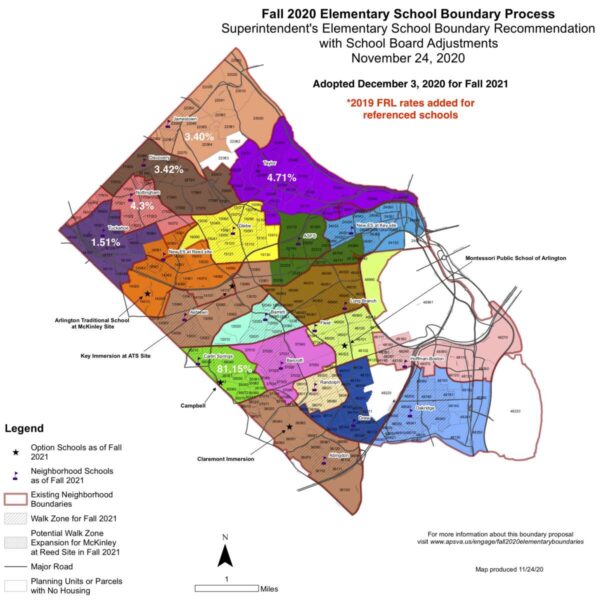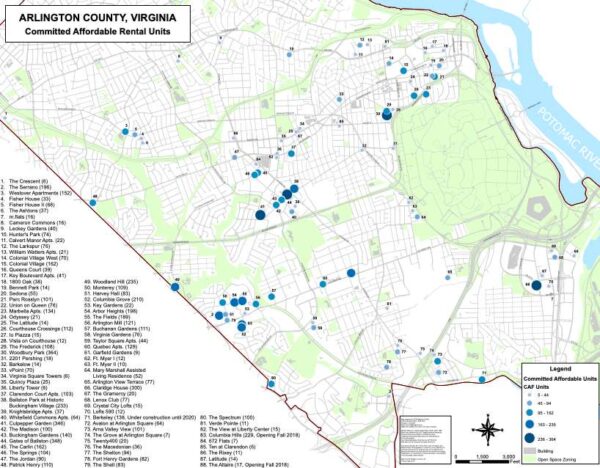Making Room is a biweekly opinion column. The views expressed are solely the author’s.
The following was written by guest columnist Kaydee Myers.
Over the next two years, the Arlington County Board and the Arlington School Board have the opportunity to create a more integrated community through four concurrent planning efforts.
Arlington County started its Missing Middle Housing Study and Affordable Housing Master Plan Review, while also drafting a plan for (the soon to-be-renamed) Lee Highway. Meanwhile, the School Board will adopt comprehensive elementary school boundaries in Fall 2022.
If the Boards coordinate these efforts, they could institute multi-family zoning in a portion of the area assigned to each neighborhood elementary school, leading to more mixed-income housing in neighborhoods currently lacking these options.
As in most public school districts in the nation, Arlington operates neighborhood schools, where most kids go to school based on where they live. Similarly, like most urban areas, Arlington County housing patterns reflect ingrained racial, ethnic, and economic segregation after years of discriminatory government policies and coordinated racist real estate practices. Our schools reflect this housing framework.
Past efforts, such as busing for integration, have fallen out of favor with parents, elected officials, and the courts. Other efforts, like option schools, are models for integration, but are not widespread enough to change the system. Plus, APS reports that Arlington parents voice a strong preference for walkable neighborhood elementary schools, and there are valid economic, environmental, and health benefits for promoting this walkability.
With this backdrop, APS is unlikely to challenge the status quo. However, APS can increase integration with intensive joint planning with the County Board to address school segregation where it starts — its neighborhoods. Many community members, including School Board member Reid Goldstein have called for this joint planning. But, despite being one of the 10 people in the County able to implement this collaboration, Mr. Goldstein didn’t elaborate on how to get started.
The most promising opportunity to improve integration within APS is the County’s Plan Lee Highway initiative. By reimagining Lee Highway as a walkable urban boulevard, a rezoning effort could add mixed-income housing in the northernmost quarter of Arlington — neighborhoods with the highest median incomes, which flow to elementary schools with the lowest poverty rates in the County.
Consider the household income, school rates of federal free or reduced lunch benefits (“FRL”), and committed affordable rental units (“CAFs”) in this northernmost quarter (north of Lee Highway and Spout Run Parkway):
- Per 2019 American Community Survey data, every census tract has a median household income of over $200,000 (and only one in south Arlington does)
- All five of the elementary schools have 2019-2020 FRL rates of less than 5% (the County average is 29% and Carlin Springs reaches 81%)
- There are no CAFs (the area is basically cut off the 2018 map showing Arlington’s CAFs).
Housing policy for Lee Highway must encourage missing middle housing (anything between a single-family home and a mid-rise apartment building) and further incentivize committed affordable housing (reserving housing for lower-income families). Any multi-family development built north of Lee Highway (and most built just south) would inevitably be assigned to one of these affluent elementary schools.
In addition to adding housing and increasing diversity, the redevelopment of Lee Highway with mixed-income housing provides many advantages to overcome the usual flurry of objections to rezoning. First, it is in desperate need of redevelopment — dotted with auto shops, car dealerships, run-down strip retail, and even empty buildings and lots. This property has a much higher and better use, which could add welcome ground floor shopping, services, and dining for residents.
Second, the five elementary schools north of Lee Highway are all under capacity (even without factoring in students who left during the pandemic), leaving them targets for another school swap as staff suggested in last fall’s boundary process. If these areas want to keep their neighborhood elementary schools, they need more students nearby.
By placing new mixed-income housing along Lee Highway, neighborhoods, and, in turn, elementary schools will become more economically integrated, which will bring racial and ethnic integration.
The School Board has blamed our housing framework for segregated schools, and the County Board has claimed they don’t have authority over school boundaries. Instead of passing the blame back and forth, Arlington’s elected leaders must accept their joint responsibility and work together on housing and schools.
Kaydee Myers is a real estate attorney and investor. She lives with her family in Arlington and is working on her Graduate Certificate in Walkable Urban Real Estate Development at George Washington University. She writes about walkable development, housing policy and historic preservation on Instagram @thewalkablelife.




